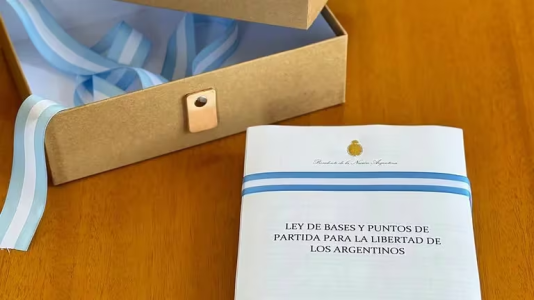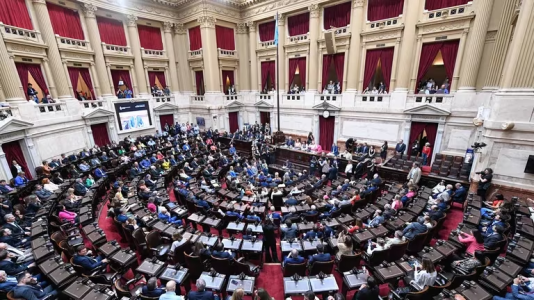perroc
New member
This is how the Omnibus Law was drafted, after the modifications agreed upon by the Government and dialogue-oriented sectors of the opposition -Infobae

Source:

Así quedó la redacción de la Ley Ómnibus, luego de las modificaciones que consensuaron Gobierno y sectores dialoguistas de la oposición
El texto que se debatirá a partir del martes en la Cámara de Diputados tiene casi la mitad de las páginas de las que tenía la versión original que se envió a fines de diciembre. Además del capítulo fiscal, hubo algunos cambios
January 28, 2024
The text that will be debated starting Tuesday in the Chamber of Deputies has almost half the pages of the original version that was sent at the end of December. In addition to the tax chapter, there were some changes

The original text
After several weeks of extensive negotiations and last-minute changes at the request of the “dialogue” opposition, the Government delivered this Sunday the final version of the omnibus law that will be debated in the Chamber of Deputies starting next Tuesday.
Less than 48 hours before the session called to discuss the reform package sent by President Javier Milei at the end of December begins, the text that is actually going to be discussed was known, which has almost half of the pages than the original project had.
The most important change with respect to the document that obtained an opinion from the commissions last week and the one that will be discussed now has to do with the fiscal issue, since it was eliminated, as the Minister of Economy, Luis “Toto” Caputo , had anticipated. the entire chapter in question.
In this way, the articles referring to money laundering, the increase in withholdings, the moratorium, the advance of Personal Assets, the Earnings Law and the new formula for calculating retirement benefits, among other issues, were not included.
In its original version, the Omnibus Law raised export duties to a floor of 15% for products sold abroad that until today paid nothing. For soybeans and their byproducts (such as flour or oil) the rate was going to be 33 percent.
Other products such as hydrocarbons or mining were going to maintain the current rates, although there would be the door to increase them, if necessary, with a limit of 15 percent. Industrial exports were included in this last increase.

The Chamber of Deputies will begin to discuss the reform package on Tuesday
However, all this was left out of the initiative: “There is dissent in the economic chapter, we have listened to all of them and we share many of those complaints. We have had to make uncomfortable decisions to reach zero deficit, but in no way do we want this fiscal chapter to delay what we believe is necessary and urgent,” Caputo explained in his press conference .
Article 106 of the norm is also no longer present, which suspended the application of the mobility formula used to update retirement and pension benefits, the Universal Child Allowance (AUH) and the Pregnancy Allowance, for example.
The proposal to modify the Income Tax for individuals, renamed the Personal Income Tax, which the Government had announced a few days ago, was also withdrawn.
Laundering, meanwhile, was going to be free for amounts less than 100 thousand dollars and, from that figure, what was charged was going to depend on the moment in which the taxpayer decided to enter the regime, establishing three stages for do so, which ranged from May 31 to the last day of validity of the externalization of assets.
Furthermore, compared to the original December document, the declared emergencies were reduced from 11 to 9, leaving those that are in economic, financial, fiscal, pension, security, health, tariff, energy and administrative matters, but no longer in security or defense.
All the changes that had been agreed upon prior to the signing of the opinion were maintained, such as the elimination of the chapter on public health and the modifications regarding the defense of competition, the hydrocarbons and biofuels regime, the energy transition and of environmental legislation, among others.
Likewise, INTA and CONICET were excluded from the powers of dissolution in the administrative reorganization section, so the Government will no longer be able to modify specific assignments for these organizations.
Finally, among other points, the broad delegated power of former article 13, linked to competition, was removed, and the powers on extension of jurisdiction and termination of contracts were changed and limited.
The complete final document:
Ley bases - Version 28.01.pdf
 drive.google.com
drive.google.com

